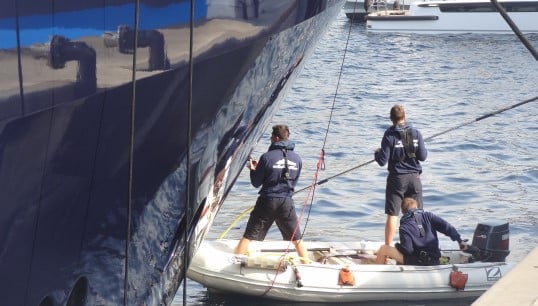
Nautilus is advising yacht sector members to be mindful of their entitlements in case of illness or injury while working – and to ensure they are covered for any loss of income if disaster strikes. Strategic organiser Cheryl McCann explains why
The yacht sector is often perceived as glamorous – but this can disguise the fact that working onboard any vessel poses dangers to those involved.
Nautilus sometimes hears from members who have been injured or have fallen ill at work and who find themselves in a difficult situation. However, there are steps you can take to protect yourself from some of the consequences of such an event.
Your entitlements
The Maritime Labour Convention, 2006 (MLC) sets out important protections for seafarers regarding illness and long-term injuries. Here is a breakdown of the key protections shipowners must provide to you.
Financial security
Shipowners are required to have financial security (like insurance) to cover their liabilities in cases of long-term disability of seafarers due to occupational injuries, illnesses, or hazards. This ensures seafarers receive compensation. Your financial security must be evidenced by certificates carried onboard your vessel.
Medical care and treatment
Shipowners are responsible for the costs of medical care, treatment, and the supply of necessary medicines and appliances for injured seafarers whilst away from home
Payment of wages
Shipowners must continue to pay the seafarer's full wages while they are sick or injured onboard, and until they have been repatriated (i.e. provided with transport back to their home). Once repatriated, sick pay can be limited to 16 weeks from the date of initial injury or illness.
Repatriation
Shipowners are obliged to cover the costs of repatriating seafarers who are injured or become ill, until they have recovered.
Limitations to entitlements
It is important to remember that if you are ill or injured and are signed off employment as incapacitated, your employer may limit sick pay to a 16-week period.
This timeframe might not align with the actual duration of recovery, leaving you without an income when you need it.
You may also be exempt from sick pay and medical benefits from the shipowner if you were injured other than in service of the ship, through wilful misconduct, or if the condition is pre-existing and not previously declared to your employer.
Medical and income insurance
Many seafarers overlook the importance of having their own comprehensive medical insurance, as vessel-provided insurance often only meets the minimum requirements set by the flag state.
Nautilus is an advocate in the UK for the National Health Service and for the state-run Dreadnought Medical Service, which provides seafarers with care that is tailored around the nature of their work, including travel.
However, you may be a national of another country with a different healthcare system, or you may not have access to these services immediately when working abroad (and depending on the nature of your illness/injury), so it is important to ensure that you are able to access the care you need without incurring unwanted medical bills.
Therefore, given the limitations to the protection offered by the MLC, supplemental insurance may be a good idea for your financial and physical wellbeing.
Choosing your insurance
Here are some pointers on what to look for in your health insurance policy.
Comprehensive coverage
Look for policies that cover a wide range of medical expenses, including hospitalisation, surgery, rehabilitation and long-term care.
Global coverage
Seafarers – especially in the yacht sector – travel internationally, so ensure the policy provides worldwide coverage, including emergency medical evacuation.
Pre-existing condition coverage
If applicable, seek policies that offer coverage for pre-existing conditions, even if it comes at a higher premium. Remember that any pre-existing conditions must also have been declared at the medical assessment for your fitness-to-work certificate (known in the UK as ENG1).
Income protection
This provides a regular income stream if you're unable to work due to illness or injury. It can bridge the gap between limited employer sick pay and long-term recovery
Tags
